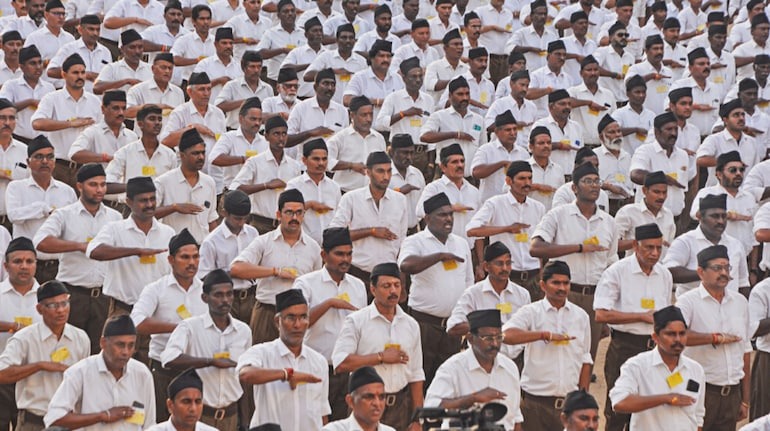
The Akhil Bharatiya Pratinidhi Sabha (ABPS), the culminating decision making body of the Rashtriya Swayamsevak Sangh (RSS), will hold a three-day meeting that is strategically important as it comes on the heels of the preparations for its centenary celebrations. This year, the RSS will turn 100 on Vijaydashami. From October 2025 to October 2026, the celebrations will commence. The outreach was another vital aspect which the RSS wishes to strengthen. The ABPS, which is in Bengaluru from March 21 to March 23, will make decisions pertaining to the final events planned celebrating the centenary of the RSS.
On a broader scale, understanding some of the issues about which the RSS works is vital, although they may not be expressed in a straightforward manner due to the lack of a centralized book of ideology for the RSS – there is no one single text for the RSS to cling to. These guiding principles of the organization’s functioning are helpful to understand the objective of the RSS, the operations, and the reasons there have never been any succession problems, which is extraordinary compared to most other organizations, even after having completed a century. These principles are also what makes the RSS the largest paradoxical voluntary organization without formal membership in the world. In spite of the absence of a membership system, countless disciplined and motivated cadres, selflessly wish to work for the society.
The foremost principle of the RSS is that it’s intended to corral and devise social change so that all members can achieve their optimum potential. Hence the RSS has now freely described itself as a not as a part of an organization within society, but as a multiplier that assists the society to organize itself.
The second core principle - which stems from the previous one - is that when society gets completely transformed and the RSS’ objectives have been achieved, it does not need to receive any acclaim because it is the society which has transformed itself. This principle explains why the RSS maintains a distance from publicity. An intriguing thing regarding the RSS is that its publicity branch (Prachar Vibhag) was formed in the mid 1980s, nearly sixty years after the organization was formed. The scope of activities of the RSS publicity branch is so designed that the nationalist ideas of the country are projected rather than the works and activities of the organization.
The third core principle of RSS states that there exist two categories of individuals in society, those who belong to the RSS and those who are yet to join. Top sources within the RSS have claimed, both in private sessions and on public platforms, that when someone has a negative opinion of the RSS, it suggests that the organization has a lot more work to do in terms of engaging and explaining the essence of the organization to its critics. For this reason, even after being a victim of several falsehoods spread by political figures, scholars, and civil society members, the RSS chooses not to engage in a war of words. The organization is of the opinion that, at the end of the day, the most implacable critics will embrace the organization. This, in fact, has occurred with a numerous former critics of the RSS who subsequently became members of the organization and served it whole-heartedly.
For instance, MG Bokare, one of the country's most well-known economist and later vice chancellor of Nagpur University, was a leading figure in the ideological functions of the Left parties. Nonetheless, his friendship with Dattopant Thengadi, a renowned RSS ideologue, resulted in an to and fro of ideas. Bokare recalls how Thengadi persuaded him to research the economic traditions found in Indian mythology. The result was Hindu Economics, a groundbreaking book written by Bokare in 1993. He also became the first national convenor of the Swadeshi Jagaran Manch (SJM), a public policy started as a peripheral wing of the RSS focusing on economic and national issues.
The fourth fundamental doctrine of the Sangh is that it will always work in society through its primary instrument, which is the daily 'Shakha'. This system is specifically designed to assemble volunteers in defined areas at specific times on each day. The gathering lasts for one hour. More than seventy thousand shakhas are held throughout the country. Shakha is viewed by the Sangh as a means for shaping one's character. Those who volunteer, usually as children or teenagers, are steered from the outset to think in terms of 'country and society’ instead of ‘I’.
Upon reaching adulthood, a number of individuals take up social work in their preferred sectors, while others decide to remain within the organization in order to reinforce and broaden its shakhas. Those who step outside either start new initiatives or join those which were previously established by RSS volunteers within their particular spheres of interest. The RSS provides guidance for these initiatives and the volunteers who have transitioned into other professions. This is how over thirty national institutions have emerged, making a tremendous difference in virtually every domain, from education to tribal development. Some prominent institutions established and operated by such volunteers include Akhil Bharatiya Vidyarthi Parishad, Sewa Bharati, Vanvasi Kalyan Ashram, Bharatiya Mazdoor Sangh, Vidya Bharati, and Vishwa Hindu Parishad as well as Pragya Pravah.
The centenary celebration plans of the RSS will revolve around these guiding pillars with special emphasis on “Shakhas” which have been the organization’s unchanged feature since 1925.
Read More: Holi, Bhang, and the High Court CJI Suryakant’s Viral Remark on Post-Festival Recovery

 Share
Share


_853562307_100x75.jpg)
_1063032679_100x75.jpg)